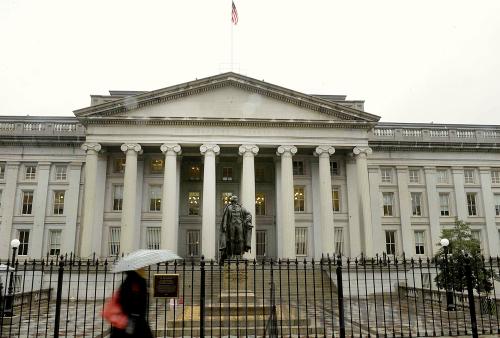|
 |
|
Albert Keidel, senior fellow at the Atlantic Council of the United States | The U.S. Department of Treasury's decsion to postpone its mid-April report labeling China a "currency manipulator" was all but expected. Beijing Review reporters Chen Wen and Liu Yunyun attended a discussion titled "Does China's Present Currency Valuation Undermine the Global Economy?" held at the Center on U.S.-China Relations of the Asia Society on April 26. At the discussion, Albert Keidel, senior fellow with the Atlantic Council of the United States, argued against the idea that China's currency policy is damaging the global economy. Edited excerpts follow:
If the world were more balanced, what would it look like?
There is the standard view that rich countries should run surpluses and poor countries should run deficits to reflect the flow of capital to poor countries. But the G20, with the exception of the United States, decided in 2005 this approach was not attractive for poor countries.
 |
|
LABELING OR NOT?: The U.S. Treasury Department has postponed its mid-April report to label China a "currency manipulator," arousing debate among American politicians and scholars (ZHANG YAN) |
And it (the view) has ignored the fact that rich countries are influential in creating the world's primary currency. In recent years, they created that currency—in the U.S. dollar and then the euro—seeing it spill forth in a large demand shock to create a series of surpluses worldwide.
The source of the surpluses was rooted in an expansion of spending power denominated in dollars that flowed out of the United States and then was used as the basis for more leveraged debt in countries like the UK, Iceland and in weaker regulated economies in the periphery of Europe.
The major driving force in the world economy over the last 15 years has been this dollar-denominated expansion. It wasn't caused by federal deficits or by U.S. monetary policies, but by deregulation of our financial system that allowed leveraging of up to 50 to 1 and an output of money denominated in dollars that's flowed not only into our housing market, but into international transactions as well.
Some say China needs a flexible exchange rate. That's a red herring.
Economists really don't know what an exchange rate should be. We might say what direction it might be going, but it's really bad to try to say, "Well, it ought to be at this point."
Purchasing parity is not a good way to see where it should go, but we can say with great authority that if a country has an open capital account, so that financial flows in the short term can move back and forth with ease, then it cannot have a fixed exchange rate. If it does have a fixed exchange rate, money will flow in and out based on interest rate differentials and it will loose control of its monetary policy. So it's a mantra that nobody argues with that China should have a flexible exchange rate, if it has an open capital account. But China doesn't have an open capital account.
Market forces can determine the value of something only if the market is allowed to play its full role. But in China's case, the market is seriously constrained—it doesn't have open capital flows. It's hard to say exactly what would happen to the exchange rate if China opened its markets to allow unregulated capital flows, but initially there would be this enormous sucking sound, metaphorically speaking, of money leaving China to invest in other parts of the world. What would that do to the exchange rate? It would have to be depreciated dramatically as everybody tries to sell their renminbi (the Chinese currency). So there isn't a market condition for such a change.
| 